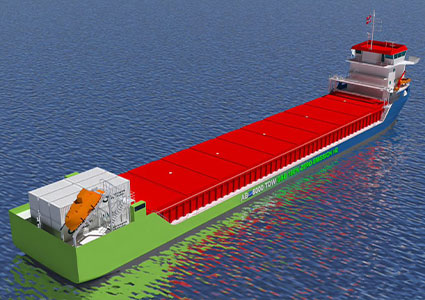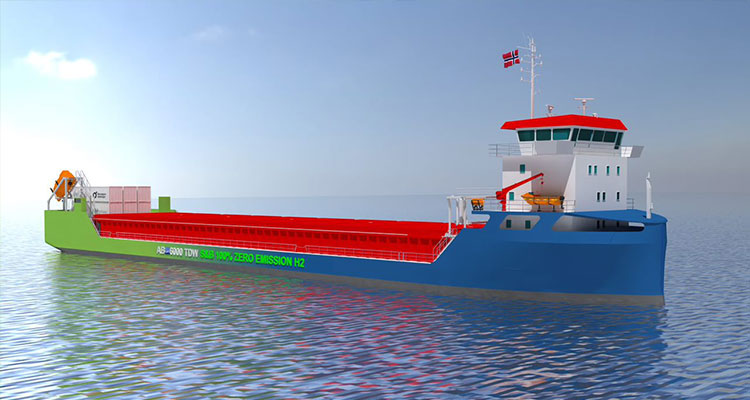How Maris Fiducia is steering maritime transportation towards a greener and more sustainable world
Maris Fiducia’s mission is to be the innovative leader and best-in-class provider of cleaner shipping technology. The company takes pride in operating a fleet of impeccably maintained tankers and dry cargo vessels, serving reputable customers who share its commitment to sustainability.
“The company was established in 2007, but my father has been in shipping since 1984,” begins Quint Vedder, Head of Innovations & Projects. “He started in the shipping business with my grandfather and when I was younger, I used to visit the ships. At a relatively young age, I realized that these vessels are considerable pollutants and from that moment, I was determined to see what I could do to make them less so. I studied maritime engineering and made it my life’s goal to build zero-emissions vessels. Today, Maris Fiducia is not only a holding company for management companies and owning companies but is also shaping the future of maritime transportation towards a greener and more sustainable world.”
Hydrogen power
Maris Fiducia’s holding company consists of two management companies. South End Tanker Management is a young and dynamic tanker company that provides ship management services to the maritime industry. Its fleet consists of nine chemical tankers which can carry a wide range of chemicals and oils. It offers technical management, vetting and quality management, purchasing and crewing services to its ships.
Grona Shipping boasts a 36-year history in international shipping markets and delivers the highest level of service to long-standing clients. Services are offered in complete management packages or individual modules, tailor-made to suit customers’ needs. Maris Fiducia operates primarily in the North Sea basin, the Baltics and in Sulphur Emission Control Areas, but also has missions over longer distances and intercontinentally.
“A little over one year ago we were inspired by a conversation with Jorgen Kopperstad from Norwegian Hydrogen about fuel availability and technical competence in the Norwegian maritime cluster,” Quint elaborates. “It has been quite a journey since then, but we are only just starting.”
Enova, a Norwegian state enterprise, recognized the strong case for dual fuel hydrogen propelled vessels and awarded a grant, enabling Maris Fiducia to establish a further subsidiary. Maris Fiducia Norway AS (MFN AS) is a Norwegian company established in 2024 and 100-percent owned by Maris Fiducia in the Netherlands. MFN AS will build and operate ten new hydrogen-powered dry cargo ships. 
“We are thrilled that Enova recognized the strong case for the project with the grant we were awarded. When we heard that Enova would give us the grant, we were able to ensure the project’s commercial viability. “The NOK 300 million grant is awarded under Enova’s hydrogen in vessels program, which aims to contribute to market change by supporting companies that will use hydrogen as fuel in vessels and support the development of zero-emission vessel technologies. The project will go ahead with maritime technology company HAV Hydrogen, and hydrogen producer and distributor Norwegian Hydrogen as subcontractors.”
The funding is for the construction of five 6000-dwt dry bulk vessels with dual-fuel engines that will run on hydrogen, with additional fuel cell systems for auxiliary power where traditional vessels would have diesel gensets.
“With investment and shipyards in place, we are at the point of making the contracts effective with the shipyard for the first five vessels. The following five vessels will be even more interesting than the first, as they will be hydrogen only,” he shares.
“We actively seek out projects that involve alternative fuels and focus on environmentally friendly maritime transportation logistics for reputable customers and transport for innovative ecological organizations. Our vision is to make the oceans green again.”
Cutting-edge technology
Hydrogen-powered ships are emerging as a potential solution to sustainable shipping. Hydrogen fuel cells are devices designed to convert the chemical energy of hydrogen and oxygen into electrical energy, with water as its only byproduct. They function like batteries, but don’t require charging. Traditional maritime fuels however, such as diesel, produce significant CO₂ emissions and emit harmful pollutants. Although maritime hydrogen applications are in their early stages of development, the future for this technology is promising.
“There are a lot of people interested in this new technology,” Quint continues. “As such, we need to attract more people like our new director in Norway. We work with numerous clients and try to build a network of like-minded people who are willing to work on these new technologies. We do find that many people are genuinely interested in sustainable innovation. That said, the infrastructure isn’t really in place yet to wholly support the technology.”
For the maritime industry to fully adopt hydrogen, a robust infrastructure and support ecosystem are essential. Adoption will require hydrogen production facilities near ports, and a network of hydrogen refueling stations, as well as collaboration between stakeholders, governments, and organizations to drive funding, policy support, and knowledge sharing.
Championing alternative fuels
Looking to the future, once built, the five dry-bulk carriers will go on hire through a zero-emission time charter agreement with Schulte & Bruns, establishing a commercial operation for vessels operating on hydrogen fuel. This project will go some way to proving the feasibility of hydrogen technologies for shipping.
“We will be applying for the second round of funding from Enova for the next five vessels, so hopefully, we’ll have positive news at the end of the year. Further afield,” he concludes, “we will continue to strive to be the front runner for alternative fuels on vessels, not only hydrogen, but also methanol. We want to buy fleets of old vessels and replace them with vessels with this new technology. In five years, I think we will be some way to achieving this.”
